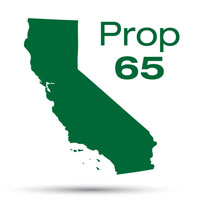California’s Proposition 65 (Prop 65), officially known as The Safe Drinking Water and Toxic Enforcement Act, is a California law that requires manufacturers to place a warning label on any product that the State of California has found to cause cancer, birth defects, or other reproductive  harm. This law was initially enacted in 1986 to assist Californians with making informed decisions on the products they were purchasing which might impact their drinking water. Since then the law has been extended to include all routes of contact such as eating, drinking, touching, and inhaling. Prop 65 helps consumers stay informed with what chemicals they are in contact with. The basic premise required products to have warning labels; however, products can vary in their use, consumption and how they come in contact with people. For example, a Prop 65 warning may be listed on something simple like a food storage container in restaurant or a more complex product such as a pressure transmitter used to measure water pressure in a municipal drinking system.
harm. This law was initially enacted in 1986 to assist Californians with making informed decisions on the products they were purchasing which might impact their drinking water. Since then the law has been extended to include all routes of contact such as eating, drinking, touching, and inhaling. Prop 65 helps consumers stay informed with what chemicals they are in contact with. The basic premise required products to have warning labels; however, products can vary in their use, consumption and how they come in contact with people. For example, a Prop 65 warning may be listed on something simple like a food storage container in restaurant or a more complex product such as a pressure transmitter used to measure water pressure in a municipal drinking system.
Identifying and informing consumers about potential harm is an excellent idea; however, the broad sweep and extensiveness of the legislation can cause confusion when applying it appropriately to products. Between 2008 and 2013 there were roughly 2000 complaints that were filed under Prop 65. Although manufacturers are required to place a warning label on their products, they do not have to spell out exactly which chemicals are in the product. The only way a consumer can discover which chemicals a product contains is by contacting the manufacturer. Future state for 2018 requires manufacturers to include at least one substance per hazard (cancer or reproductive harm). This will ultimately increase a manufacturer’s costs as they scramble to meet the new requirement this late in the year.
Manufacturers currently have two options when it comes to labeling: 1. Label their entire product inventory even if it is not sold in California 2. Create a different manufacturing line for products sold only to California
Due to the many lawsuits filed under Prop 65 and the financial impact it is having on companies, there have been many debates about the law. Some people are suggesting that it should be repealed while others believe it just requires modifications. Regardless of the future of Prop 65, manufacturers have to think about how they are going to meet the requirement.
Manufacturers need to verify whether their products contain any of the over 800 chemicals listed under Prop 65. If so, they must consider the following questions:
- Will they create a new manufacturing process, or just discontinue selling products to California?
- Will they openly disclose which chemicals their product contains, or only disclose the information if a customer calls?
- Is the amount of a listed chemical in the product high enough to be reasonably considered hazardous?
A manufacturer has to proceed with extreme care to avoid any possible negligence of Prop 65. Many manufacturers now label products whether or not it is required “out of an abundance of caution” or put another way, fear of a costly lawsuit.
All manufacturers selling into California must understand how Prop 65 will impact their products or the use of another manufacturer’s product. Understanding the requirements and working with vendors who have already properly labeled and are meeting the intent of Prop 65 will be a good step to begin navigating this legislation.

